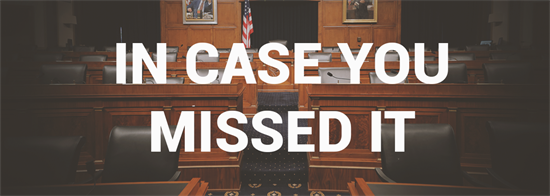Before You Leave The Swamp...A House committee prepares a contempt case against Richard Cordray
WASHINGTON,
August 4, 2017
By James Freeman Republican staff of the House Financial Services Committee have completed a legal analysis concluding there is sufficient basis for Congress to initiate contempt proceedings against Consumer Financial Protection Bureau Director Richard Cordray. The staff report, which may be released as soon as this afternoon, describes how Mr. Cordray has defied a committee subpoena for documents related to his effort to ban arbitration agreements. The arbitration ban itself was a Beltway beauty, designed to benefit the trial lawyers lining up to fund an expected Cordray run for governor of Ohio. Getting rid of arbitration as a way to resolve disputes between financial consumers and service providers would allow more class-action lawsuits. A Journal editorial explained why the House voted last month to repeal the rule: Mr. Cordray said the ban would protect consumers, but his own agency’s study suggests otherwise. Consumers who prevailed in arbitration recovered on average $5,389 while those who joined class actions received $32. Trial lawyers on average raked in $1 million. Most claims can’t be litigated on a class basis—though trial attorneys try—and arbitration provides an affordable and expeditious alternative. Companies typically pick up most if not all of the filing, administrative and arbitrator costs. Consumers usually obtain relief within two months, while class actions typically take years to resolve. Readers may also recall that Mr. Cordray’s bureau executed an appalling series of shakedowns against auto lenders, described in another editorial in 2015: The regulators are simply guessing the race of borrowers based on their last names and addresses in the loan files and then claiming racism if the people they guessed were minorities seemed to be paying higher rates. This was too much even for House Democrats like Rep. David Scott of Georgia who said the bureau’s work was based on “shamefully flawed” and “inaccurate” information. At a hearing Rep. Scott told Mr. Cordray, that “it was downright insulting to African Americans because you just assume their last name was Johnson or Williams or Robinson or maybe even Scott.” The Georgia Democrat added that “you directed an extraordinary and deceitful approach.” Did Mr. Cordray’s bureau employ the same deceitful approach when it was crafting its lawyer-friendly arbitration rule? What’s clear is that for more than a year, the bureau has resisted turning over key documents sought by Chairman Jeb Hensarling’s House Financial Services Committee. Running a sort of bureaucratic version of the four-corners offense, the Cordray crowd has dragged its feet on responding and then periodically shared files that were incomplete, irrelevant or already available to the committee. What are they hiding? As one of the most active creatures in Washington’s bureaucratic swamp, Mr. Cordray leads an outfit that has dropped broad civil investigative demands for documents on companies across the financial landscape. The bureau hardly seems to care if the firms are even within its jurisdiction. Now the Cordray gang doesn’t want to allow a congressional committee exercising its legitimate oversight powers to get a good look inside. Another classic Washington double standard. While Barack Obama was president, regulators like Mr. Cordray could laugh at a contempt vote in Congress. But now the stakes are a little higher because the Trump Justice Department could choose to act. If the House cited Mr. Cordray for criminal contempt he could be staring at a misdemeanor charge with possible jail time. The House could instead choose to cite him merely for civil contempt, which would allow the House to sue him for the documents in federal court. House Financial Services is now in the process of taking depositions from several senior bureau officials. Mr. Cordray has done his best to expand the Beltway swamp. Before he tries to do the same in Columbus, perhaps he will finally be held to account. |


